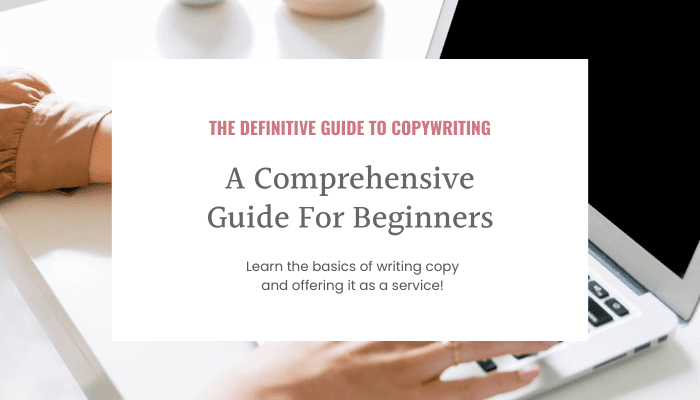How To Market Your Copywriting Business (Complete Guide)
Learn how to market your copywriting business to book ideal clients.
Table of Contents
Starting your own copywriting business can be quite an adventure, but figuring out how to market your copywriting business and land clients can feel challenging when you’re new.
In this post, I’ll break down the methods you can use to market your copywriting services and get the best results (even with limited time).

What You Need To Market Your Copywriting Business
Before you market your copywriting business, there are a few things you should have in place first.
As excited as you might feel to jump right in, having these elements in place first will ensure you have the proper foundation.
Copywriting Training
Before you offer copywriting services, it’s essential to get proper training. Learning copywriting principles and getting hands-on practice will ensure you deliver high-quality work to your clients and build a reputation as a trustworthy copywriter.
I created a free copywriting class that walks you through the basics of writing copy and finding new clients.
You can also learn copywriting skills with books by other successful copywriters. Some of my favorites include The Adweek Copywriting Handbook by Joseph Sugarman and Copywriting: Successful Writing for Design, Advertising and Marketing by Mark Shaw.
Writing Samples & Portfolio
Once you understand how to write copy, the next step is to create writing samples that showcase your work.
You don’t need a website to get started, but eventually, I do recommend creating one. When you’re starting out I suggest creating a shared folder in Google Drive to easily share your writing samples.
The kind of writing samples you need will depend on the kind of projects you want to take on…
If you want to specialize in email copywriting, then you should have multiple samples of email copy. If you want to write websites, you need to include at least 2-3 web copy samples, and so on.
I recommend including at least 3-5 samples of your best work, but you can include more for variety.
Here are some examples of copywriting samples you can create:
- Website copy
- Email newsletters
- Email sequences
- Facebook ads
- Landing pages
- Sales pages
- Blog posts
You can also create a digital portfolio. A portfolio differs from writing samples in that it can include more than just you’re writing.
If you’d like to learn more about how to create a new portfolio (even if you’re inexperienced), I share a step-by-step framework you can copy on this podcast episode below:
This Instagram reel I posted also takes you inside my portfolio and shows you exactly what I include. If you want an idea of how it might look visually, I suggest checking that out!
A Strong Pitch
Once you have copywriting skills and samples to showcase your work, you need a strong pitch to properly market your copywriting business and land ideal clients. You can download the exact pitch I use in my own agency to get started.
You probably can’t believe I give that away for free (sometimes I can’t either), but it’s helped hundreds of freelancers in their business and I know it will help you too. That makes it all worth it!
A Professional Website (Optional But Recommended)
You don’t need a website to start landing copywriting clients, but it does help you look more professional. If you’re able to invest in a simple, DIY website, I highly recommend it.
Having a professional website will help you when implementing some of the advanced strategies I’ll share later in this post.
If that’s going to get in the way of you getting started, however, I encourage you to keep working on other ways to market yourself until you’re able to publish your site.
For my copywriting business, I created a simple WordPress website using a Kadence template and wrote the copy myself!

For my other websites, I use customizable templates from Restored316. What I love about their templates is the pre-made layouts. The sites come with everything you need to get started quickly.
I use their themes for two other sites I have, and it was one of the best decisions I’ve made for my brand!
How To Make Your Copywriting Business Stand Out
Your “brand” is the perception that others have of your business. It includes everything from aesthetics like your logo, colors, fonts, etc. to your core values, messaging, and content.
A strong brand will help you stand out from other copywriters and help potential clients resonate more strongly with you over another copywriter.
I like the “5 Characteristics of a Successful Brand” mentioned by Craveity Marketing:
- Understand your audience. This ensures you appeal to their problems and desires.
- Appeal to emotions. This helps you express the intangible aspects of your brand.
- Accurate representation of the company. Defines what your company is about.
- Extendibility. Reach your target audience through every channel necessary.
- Uniqueness. Create a brand that is easily identifiable, but different from others.
There is a lot that goes into building your brand, but I’ll cover some of the basics below to help you get started.
Choose Your Ideal Client
Your ideal client (also called ideal client avatar, or “ICA”) is a description of the kind of person you are targeting with your marketing.
Understanding who you’re speaking to ensures your marketing resonates with that specific person.
After all, when you try to speak to “everyone” you’re speaking to “no one” because your marketing will be generic.
When I first started my business, my ideal client was mom entrepreneurs. Now, my agency caters to service providers, coaches, and course creators with high-ticket offers.
Your ideal client could be non-profits, coaches, nutritionists, interior designers, photographers, creatives, or etc.
For an extensive list of client niches, check out this list of 100 client niches.
Find Your Value Proposition
Your differentiating factor (often called a unique selling proposition or “USP”) is what sets you apart from others who offer a similar service.
In my agency, our USP is that we help businesses scale without paid ads or social media.
Nailing your value proposition early on will help you stand out and resonate with your customers.
According to Yesware, when a buyer is overwhelmed with options, they need to quickly understand what makes you different from the rest or they’ll move on to the next option.
Here are some examples of great unique selling propositions:
- HelloFresh is “America’s Most Popular Meal Kit.”
- Dollar Shave Club gives “a personalized top-shelf grooming routine as unique as you are.”
- Anchor is “The easiest way to make a podcast.”
Create A Consistent Aesthetic
Part of what differentiates your brand from your competitors is your brand style.
This can refer to the visual aesthetic of your business, but can also refer to your content and brand messaging too.
As an example, here are two landing pages I pulled from my own businesses:

The landing page above is from this site, The Virtual Mama. The style is feminine, airy, and light-hearted. My copy is very casual, fun, and sometimes sarcastic.

The next landing page above is from my digital agency, honeyDIGITAL. The brand style is a day-and-night difference from what you see here at The Virtual Mama (and that’s because it speaks to a different audience).
The copy uses casual language, but isn’t quirky at all – I keep a mostly serious tone.
The branding is black and white with a splash of bold color, while The Virtual Mama uses tones of pink, brown, and grey.
Can you note the style differences? If you go to the social media accounts of either brand, you’ll notice I follow the same guidelines with the content I post there.


Whichever style you choose, it’s important to maintain consistency across all of your marketing channels!
Choosing Your Marketing Channels
Many business owners feel overwhelmed by marketing themselves because they’re trying to show up everywhere, and it becomes time-consuming.
The key to marketing your copywriting business effectively is to choose at least one platform that you can use consistently.
Before choosing a platform ask yourself:
- What are my marketing goals?
- What is my budget?
- Where does my target audience spend their time?
- What is working for my competitors?
Here are some marketing channels that can work well for copywriters in any niche…
Social Media
These channels can be used to help you attract other professionals in your niche and develop authentic connections.
This is considered the world’s largest professional networking and career development platform.
People use LinkedIn to:
- Find jobs or internships
- Connect with other professionals
- Learn new skills for their career
- Strengthen professional relationships
LinkedIn is a great platform to build your authority by posting short or long-form articles that showcase your expertise.
Your content doesn’t need to be long to be effective, but it does need to give value. Showing up consistently is also key to winning on LinkedIn.
Facebook groups are an effective place to do research, network, and collect specific information about your audience.
You can also consider starting a Facebook group of your own to create a community of prospective clients!
Fun fact: when I first started as a freelance writer, Facebook groups were one of the main ways I booked new clients!
The gram is a great place to add value and engage with your audience using visuals. If you don’t plan on taking advantage of all the platform’s features, however (like stories and reels), it might be better to start with LinkedIn or Facebook.
Learn the organic growth strategy I use on Instagram.
Blogging
It’s not essential to have a website when starting out, but if you do then publishing high-quality blog posts can help you build authority and even get organic traffic with SEO.
The fact that you’re selling writing services to other businesses means that you need to showcase you can write well for your own business, and a blog can help you do that.
Publishing blog pots can be used to:
- Build your email list
- Promote your services
- Create additional revenue streams
- Become a valuable resource to your audience
- Inspire your audience in their everyday life or business
- Share compelling stories or information to build your authority
YouTube
YouTube is the second largest search engine (second to Google) and it can be an excellent way to grow an audience from scratch!
If you’d like more training on YouTube, my friend Gillian Perkins has a free workshop to help you get your first 1,000 subscribers in just 3 months.
While you may not necessarily want to launch a YouTube channel right away, it is something you can think about and plan for as you grow your copywriting career.
Podcasting
There are over 100 million YouTube Channels, but only about 3 million podcasts. That means less competition and more opportunity to build your authority in a less-saturated market.
If used correctly a podcast can help attract your ideal clients by:
- Talking about your services
- Promoting your other marketing channels
- Introducing listeners to new topics that are relevant to their needs
- Building your email list or followers on other platforms
- Showcasing your expertise while building a stronger connection with your listeners
Podcasting is one of the primary channels I now use to grow my business (and I honestly love it)!
You can listen to my podcast on your favorite listening app here. (At the time of this blog post, my podcast is now in the top 10% of podcasts!)
How To Find Clients That Can Afford You (Tactics You Haven’t Tried Yet)
One of the biggest complaints I hear from new copywriters is they struggle to find clients who can afford their rates.
Copywriting is a premium service (meaning it’s not cheap), so it’s important to pre-qualify your leads and make sure they’re ready to invest. Here are three tips that will help…
Pre-qualify your leads with a questionnaire. Many copywriters waste time on discovery calls because they don’t pre-qualify their leads before getting on a call. You can create a short intake form that asks basic questions to find out where a client is at in their business.
Here is the one on my agency’s website:

Target established business owners. If you’re cold pitching your services, you should absolutely take time to research each lead and make sure they’re either established in business or actively investing in their business.
Be upfront about your rates. You can list your starting prices or a range of your rates on your website or in your portfolio to save both you and your leads time.
More Ways To Market Your Copywriting Business
Like Minded Collective
If you need a break from Facebook, I suggest checking out a platform called Like Minded Collective.
It’s a networking community for female founders (sorry fellas), and I’ve used it to meet some great women (as well as land opportunities)!
The platform is free to join, and you can freely promote your business.
The Mom Project
The Mom Project is geared toward moms, but I had to include it because they actively post high-quality remote opportunities. (Again, sorry fellas.)
You can also check out their job postings on their LinkedIn page.
If you want to start cold pitching your services, Google is a great place to find potential businesses to pitch your services.
You can use my free Cold Pitch Template to get started.
Most people don’t love the idea of cold pitching their services, but when I started out as a new freelance writer it helped me find work and get my name out there.
(The first client I landed cold pitching is actually my good friend to this day – don’t knock it!)
If you want more in-depth training on cold pitching, you can check out my Cold Pitch Workshop. It shows you how to find leads online and customize my pitch template to accurately represent your business.
Build Your Authority With Other People’s Audiences
Even if you don’t have much of a following yet, you probably have a unique perspective that can add value to other people’s lives.
This is where collaborations come in.
You can collaborate with others who have an established audience (even if it’s a small one) to expose yourself to potential leads.
Below are a few ways that you can get started.
Create A Free Training
Course creators love adding value to their students by giving away bonuses. You can build your authority by offering a free training to someone who has a course in a related field.
For example, you can create a 30-minute video on how to self-audit your copy or how to write effective headlines. Then offer the content as a free add-on to someone you want to collaborate with.
To make it worth your time, you want to promote some kind of freebie or talk about your services at the end. That way anyone who watches the training will know how to get in touch with you if they’d like to learn more.
Be A Podcast Guest
Appearing on a podcast can help establish your authority within your niche and grow your audience.
If you’d like to learn more about how to be a podcast guest, I recommend Christina Nicholson’s Pitch, Publicity, Profit workshop. I took this workshop and absolutely loved it!
Go Live In Someone’s Community
Going live in someone else’s community (like Facebook or LinkedIn) is a great way to practice your speaking skills, grow your authority, and connect with new potential clients.
This is similar to appearing on podcasts, but I think showing your face adds a deeper layer to the “know, like, and trust” factor.
Below is an example of a live I recorded with Abbey Ashley from The Virtual Savvy. At that time, I wasn’t actually looking to grow an audience, but I wanted to share an example of what it could look like for you!
Conclusion
Learning how to market your copywriting business requires consistency! This comprehensive guide is meant to provide you with ideas, but you only need to use 1-2 marketing channels really well to see results.
Let me know, which strategy in this guide will you try?
Related Articles
Breaking Into Copywriting: Earning My First $100K
Copywriting Business Plan (Make $50-$100/Hour As A Freelance Writer)
How To Write A Copywriting Proposal (Free Template)















